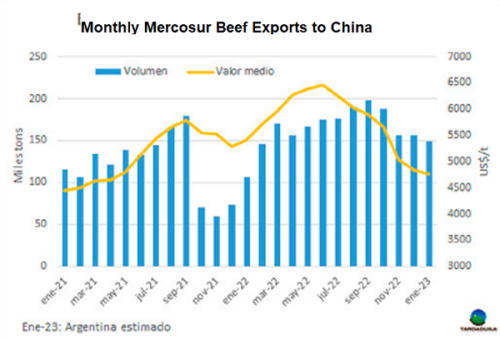28 February 2023
Since late last week, the Brazilian government announced the suspension of beef exports to China, as established by the sanitary protocol between the two countries, after the confirmation of a case of mad cow disease (BSE) in a 9-year-old animal in the state of Pará.

The duration of this suspension is key to knowing to what extent it will be a disruptive factor in the market. The protocol says that it is four weeks, but in 2021 it was extended for three months and was the main factor that caused the upward spiral of export prices during the first months of 2022. The rise between January and the peak of June 2022 was of the order of US$/t 1,000, or 19%.
That the suspension of Brazil is bullish for export prices to China is beyond doubt. In December, Brazil was the source of 48% of the beef that arrived in China, while Mercosur accounted for 3 out of every 4 kilos imported.
The expectation is for Chinese demand that tends to improve after having left the zero Covid policy behind. GDP is projected to grow 5.2% this year, according to the IMF, clearly above the meager 3.0% of 2022. One of the key sectors in this recovery is retail sales and, among them, sales in the category of hotels and restaurants, where beef demand tends to be buoyant.
Therefore, the expectation is that demand will be firm. In fact, it was already showing signs of recovery in the first weeks of the year. In this context, the suspension of beef exports from Brazil has the capacity to boost export prices, as long as the measure is extended for a reasonable time.
我们为皮革、物料及时装业界创造面对面洽谈的机会,为客户缔造实质商机。我们云集世界各地的商家,让他们寻找新的合作伙伴,发掘潜在客户或供应商,并掌握业界最新发展。
我们主办多个专注时尚及生活潮流的商贸展览会, 为这不断变化的行业,提供最全面的买家及参展商服务,方便他们了解急速转变的行业环境,并预测来季趋势。

使用条款 | 隐私政策 | APLF 可持续发展